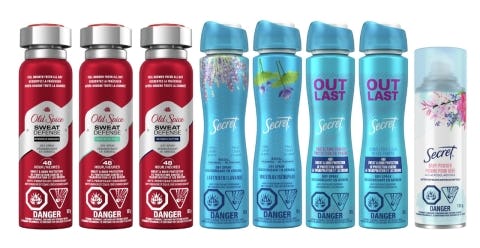
We really shouldn’t be too surprised when a grooming product is criticized for having a “toxic” chemical in it (the term itself simply means “harmful to the body”). Unless we’re rolling around in mud like god intended or slapping on clay straight out of an Icelandic lagoon, most of the stuff we rub on our bodies on any given day is highly processed and lies on a spectrum between “not great but we’ll make it” to “oh hell no.” Unfortunately, there was a recent recall on a few body sprays that appear to be on the worse end of that spectrum.
A recent citizen’s petition is raising alarms about several popular antiperspirant and deodorant body sprays that contain benzene, a chemical that experts assert can weaken the immune system and increase the risk of cancer. In response to the petition, P&G pulled 17 of its products last week, including from popular brands like Old Spice and Secret, according to CNN. So how shook should we be?
First, it’s important to note that benzene is all around us. It can be found in dyes, detergents, and some plastics, according to the FDA. During the pandemic, the FDA even allowed hand sanitizers to contain up to 2 parts per million of benzene, per CNN. On top of that some people, especially tobacco smokers, already have traces of the chemical in their bodies.
The reason the petition raised concerns was because it found that more than half of the products it tested exceeded the FDA-approved 2 parts per million of benzene — in some instances by a lot. Two samples of Pure Sport, an antiperspirant from Old Spice, contained a significantly higher 17 parts per million of the substance. And that’s when things start to get concerning: Especially in poorly ventilated indoor spaces, exposure to the benzene can damage the bone marrow, decrease red blood cells, and lead to anemia, according to the CDC. Although scientists are often careful not to say that a chemical can directly cause cancer (the phrasing “linked to a higher risk of” is more accurate in most cases) the confidence around benzene’s toxicity stands out as particularly alarming.
But beyond the noise, it’s important to note that none of the products that were tested actually contain benzene. Most likely, the problem lies in the propellant that is used to get the stuff out of the bottle, which requires its own sleuth of chemicals, experts told CNN. The responsibility then falls on the manufacturer of the propellants and now, companies like P&G are working closely with their manufacturers to make sure that they don’t end up accidentally making anything that releases cancer-causing chemicals.
This is not the first time propellants have turned out to be the toxic culprits. In the 1970s, most hairspray propellants contained vinyl chloride, which was found to cause liver cancer in lab animals, per PBS. The industry then shifted to methylene chloride, which was pretty much just as bad. For now, our best bet is to ditch the sprays that were singled out for having benzene as much as we can and revert back to the good old slap-and-rub.







